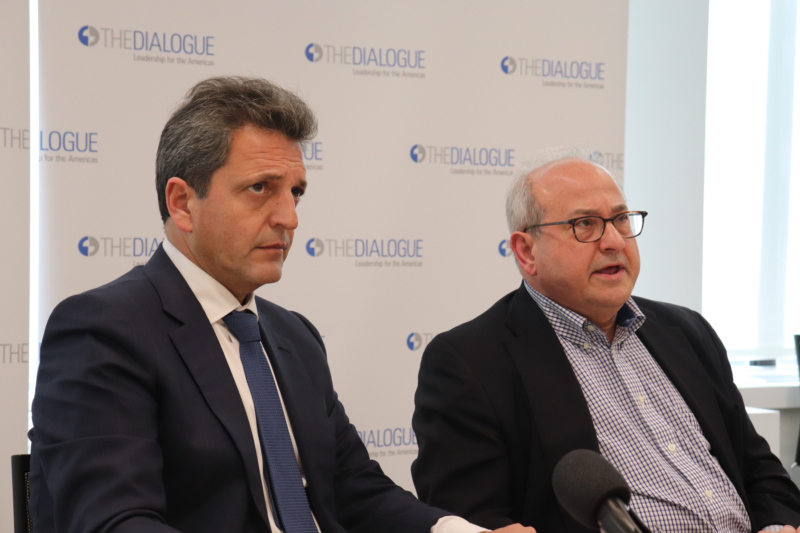The Nationalism of Cristina Fernández de Kirchner
Argentine President Cristina Fernández has increased her appeals to nationalist sentiment to build domestic political support.
On June 16, the Inter-American Dialogue hosted a private meeting featuring Sergio Massa, President of the House of Representatives of Argentina. The meeting focused on the political and economic challenges facing the Fernández administration, and the state and future of US-Argentina relations. Dialogue president Michael Shifter welcomed Massa and engaged him in a wide-ranging conversation before opening it up to other participants.
Massa said the main objective of his visit to Washington, DC was to formalize an agreement between the Congresses of Argentina and the United States, reflected in the Argentine Caucus and the Grupo Parlamentario de Amistad con Estados Unidos. Areas of cooperation between both bodies include a joint fight against hate speech and racism in social media.
During the meeting, Massa emphasized the need for multilateral organizations to adopt a more understanding posture and adapt to the dire situation countries like Argentina have to deal with as a result of the pandemic. He said the Argentine government has prioritized employment retention, better incomes, and the maintenance of credit consumption for businesses. He also made the case that Argentina is now prepared to play a more assertive role in the region and is interested in cooperating, when possible, with the United States.
On the political coalitions that characterize both the government and opposition, Massa believes the “diversity of opinions and disagreements in certain aspects of the coalitions gives more strength to the democratic system.” When asked about perceived tensions between President Alberto Fernández and Vice President Cristina Fernández de Kirchner, Massa countered that it’s normal in a coalition government to have opposing views, but in the end president Fernandez asserts leadership and provides a coherent direction for the government.
The exchange also touched on Argentina’s position in debt negotiations with the International Monetary Fund and Massa’s political future, including whether he is contemplating a presidential run in 2023. Massa was also pressed on Argentina’s controversial decision to abstain in a vote at the Organization of American States that condemned the Ortega-Murillo dictatorship’s crackdown on leading opposition figures in Nicaragua.
Argentine President Cristina Fernández has increased her appeals to nationalist sentiment to build domestic political support.
How will the Fernández administration’s policies affect the country’s economy and businesses in the long-run?
Given today’s realities, the glowing terms some used to describe US-Argentine relations in the 1990s do not make sense. But neither does the excessively negative talk heard in Buenos Aires and Washington.
 Gastón Ocampo / Inter-American Dialogue
Gastón Ocampo / Inter-American Dialogue